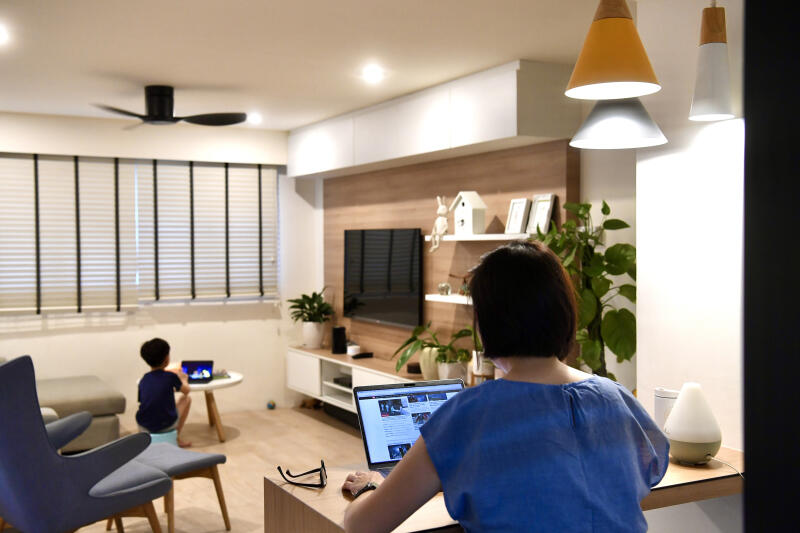MPs discuss flexiwork implementation, gender pay gap in White Paper debate on S'pore women's development
Sign up now: Get ST's newsletters delivered to your inbox

Some MPs proposed that the Government accelerate the pace of entrenching flexiwork arrangements as a workplace norm.
PHOTO: ST FILE
SINGAPORE - With the Covid-19 pandemic showing that it is possible for some workers to work from home full time, some MPs have proposed that the Government accelerate the pace of entrenching flexible work arrangements as a workplace norm.
Others said more can be done to close the gender pay gap, which they felt was not addressed adequately in the White Paper on Singapore Women's Development.
The White Paper was presented to Parliament by Minister for Communications and Information Josephine Teo on Tuesday (April 5).
On flexiwork arrangements, Mr Melvin Yong (Radin Mas), who is NTUC's assistant secretary-general, said: "While I understand that it takes time to engage the industry and ensure that there is consensus on the Tripartite Guidelines, we should strike when the iron is hot... and roll out the guidelines when many employers are still fresh from having the majority of their workforce telecommuting."
Others like Ms Jessica Tan (East Coast GRC) and Dr Wan Rizal (Jalan Besar GRC) also asked for an earlier implementation of flexible work arrangements.
Responding, Minister of State for Manpower Gan Siow Huang said a calibrated approach is needed in implementing flexiwork arrangements. Employers have to be equipped with capabilities to manage a more flexible workplace, while employees also have to understand the roles that they play in making flexible arrangements sustainable for business operations.
She pointed out that over 10,000 companies have adopted the tripartite standard on flexible work arrangements, covering more than one in four employees in Singapore today.
The White Paper proposed that by 2024, employers must consider staff requests for flexible work arrangements fairly and properly, under a new set of guidelines for such arrangements. But employers can consider their business needs when assessing whether or not to grant approval.
The gender pay gap was raised by Workers' Party MPs He Ting Ru and Jamus Lim (Sengkang GRC), as well as Nominated MP Shahira Abdullah.
Ms He said: "While this pay gap is on the decline, it nonetheless still exists, and it is disappointing the White Paper does not make addressing this an action item. Our efforts at reducing this pay gap must persist, until women in Singapore achieve equal pay to their male counterparts for equal work."
In response, Ms Gan said a practical approach is needed to close the wage gap, pointing out that even in countries like the United States and Canada that have legislated equal pay for equal work, the adjusted pay gap remains higher than Singapore's.
"The main reason for the gender wage gap in Singapore is occupational segregation," she said, adding that some women who disrupted their careers because of caregiving responsibilities are not able to earn as much as their partners.
Besides flexiwork and the gender pay gap, MPs also made suggestions on how to help more women to grow their careers and balance their homemaking roles.
To help women become home-based entrepreneurs, Mr Yong suggested a Home-Based Business Grant to help defray the start-up cost of equipment, and tie up with schools such as Shatec to provide subsidised training courses for baking, cooking and safe food preparation.
This was echoed by Mr Darryl David (Ang Mo Kio GRC), who suggested start-up grants or avenues of micro-financing for these "mumpreneurs", or mothers who become entrepreneurs.
Even as flexiwork takes root, some MPs spoke about the importance of protecting privacy and family time.
Mr Sharael Taha (Pasir Ris-Punggol) said that as flexible work arrangements blur the line between work and home, employers and workers have to come to a new understanding about work-life balance and respect for personal space and time.
The House members also said more can be done to encourage and support women to choose and excel in science, technology, engineering and mathematics (Stem) industries.
Ms Poh Li San (Sembawang GRC) noted that only 55 per cent of the women who graduated with Stem degrees or diplomas pursued related careers, compared with 70 per cent of men.
Ms He said the green transition represents a chance to ensure that women are well and justly represented in new "green jobs", adding that the gender gap in Stem skills must not be a barrier to greater gender equality.


